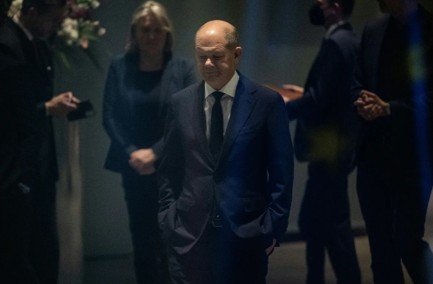In a nationally televised debate on February 9, German Chancellor Olaf Scholz of the Social Democratic Party (SPD) displayed a rare flash of pugnacity and conviction. Known more for his measured demeanor than fiery rhetoric, Scholz’s assertive performance against Friedrich Merz, the Christian Democratic Union (CDU) candidate, earned him a narrow victory in the eyes of most observers. Yet, this debate win was far from enough to close the gap between his left-of-center party and Merz’s conservatives ahead of the February 23 election. The CDU leads the SPD by nearly double digits, with the far-right Alternative for Germany (AfD) also outpacing Scholz’s party.
Despite the odds, the SPD remains the most likely coalition partner for the conservatives, meaning Scholz’s party could still join a Merz-led government. However, Scholz has made it clear that he will not play second fiddle after serving as chancellor. As a result, his political career—at least in electoral politics—is likely to end not with a bang, but with a whimper.
This is a disappointing finale for a career politician who joined the SPD in 1975 at the age of 17, inspired by the legacy of former Chancellor Willy Brandt. The son of a textile worker, Scholz rose through the party ranks as a fiery advocate for socialist policies and nuclear disarmament. Over time, his politics evolved, and he became a pragmatic moderate, serving in various high-profile roles, including vice chancellor under Angela Merkel, SPD chief, and mayor of Hamburg.
The Rise and Fall of Scholz
Scholz’s ascent to the chancellorship in 2021 was a testament to his ability to project stability and moderation. Campaigning on a promise to show more “respect” for the working class, Scholz positioned himself as a Merkel-like figure, even more so than the CDU’s Armin Laschet. His calm, unideological approach resonated with voters weary of political drama.
“Scholz projects modesty, a lot like Merkel did,” said Mark Schieritz, author of a Scholz biography, in an interview with Foreign Policy. “Neither one of them is strictly ideological or desires confrontation. They reach out across boundaries to negotiate solutions. This worked well for Scholz for a long time, but it led to his downfall, too.”
Scholz’s bridge-building skills were on full display after the 2021 election, as he forged an unprecedented three-party coalition with the Greens and the pro-business Free Democrats (FDP). Dubbed the “traffic-light” coalition for its red-green-yellow party colors, the alliance promised to modernize Germany, addressing long-neglected issues like digital innovation, climate change, and social equity.
The Zeitenwende and Its Challenges
The coalition’s ambitious agenda was derailed just weeks into its tenure when Russia invaded Ukraine on February 24, 2022. The war plunged Germany—and Europe—into a cascade of crises: energy shortages, economic instability, and the specter of nuclear conflict. Scholz responded with a bold declaration of a Zeitenwende (turning point), committing 100 billion euros ($112.7 billion) to defense spending, pledging solidarity with Ukraine, and accelerating efforts to wean Germany off Russian energy.
Through a combination of austerity measures and diplomatic maneuvering, Scholz’s government managed to avert an energy catastrophe during the 2022-2023 winter. Germany emerged more energy-independent, and Scholz earned praise for his prudence in navigating the crisis.
“The Russian war threw Germany into a massive crisis that no one had anticipated—perhaps its biggest ever,” said Lars Haider, editor of the Hamburger Abendblatt and a close observer of Scholz’s career. “Under Scholz, the coalition worked splendidly—as one team focused on a goal. Germans felt that their leadership was coming through for them.”
The Budget Crisis and Coalition Collapse
Scholz’s chancellorship might have been remembered as a success had it not been for a November 2023 ruling by Germany’s constitutional court. The court struck down the government’s plan to repurpose 60 billion euros ($64 billion) in unused COVID-19 relief funds for its “climate and transformation” package, citing violations of Germany’s strict “debt brake” rule.
The ruling left the coalition scrambling to fill the budget gap, exposing deep ideological rifts between the SPD, Greens, and FDP. Finance Minister Christian Lindner, a fiscal hawk, refused to suspend the debt brake or raise taxes, leading to a protracted budget battle that paralyzed the government. Scholz’s attempts to negotiate a compromise failed, and by November 2024, the coalition had collapsed, forcing snap elections.
“Scholz’s fatal error was to think that he could negotiate his way out of this budgetary conundrum rather than tackle it head-on,” said Schieritz. “He should have called for this hole in the budget to be covered with taxes, debt, or cuts elsewhere. But he didn’t. This turned 2024 into one prolonged budget battle that nobody could win.”
A Mixed Legacy
Despite the turmoil, Scholz’s government achieved notable successes. Germany saw a 60% increase in solar power capacity and a 14% rise in onshore wind energy. The government also introduced a nationwide flat-rate public transport ticket, raised the minimum wage, and reformed social welfare programs.
However, these accomplishments were overshadowed by the government’s failures. The war in Ukraine continues to strain Germany’s resources, the economy remains stagnant, and the country’s 2030 climate goals appear increasingly out of reach. Scholz’s cautious approach to arming Ukraine also drew criticism, alienating both hawks and peace advocates.
As Scholz prepares to exit the political stage, many wonder if he could have chosen a more dignified path. Some argue that he should have stepped aside last year to allow Defense Minister Boris Pistorius, Germany’s most popular Social Democrat, to lead the party into the election.
“Scholz shared more of Merkel than Merz does—much more,” said Haider. “We’re seeing a distinctly different kind of politician take over.”
For Olaf Scholz, the end of his chancellorship marks not just the conclusion of a political career, but the closing of an era defined by Merkel’s pragmatism and Scholz’s own attempts to navigate an increasingly fractured political landscape. His legacy, like his tenure, will be remembered as a mix of resilience and missed opportunities.


